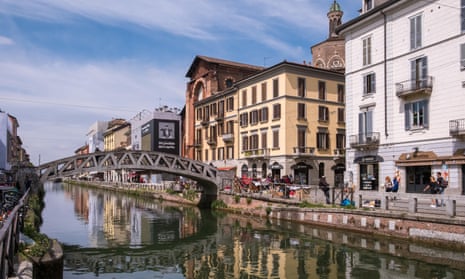It wasn’t so long ago that Milan was cast aside as a grey, uninspiring industrial city, with the only sprinkle of colour coming from its fashion sector. But the northern Italian powerhouse now has a newfound energy and confidence – and it’s partly driven by Brexit.
As the consequences of the UK’s withdrawal from the EU have kicked in, a significant number of bankers, fund managers and other financial services workers have shifted from London to Milan – an option that would never have been considered a decade ago.
“Milan never used to be a place of action,” said Silvia Pace, a fund manager at S14 Capital, an asset management firm, who moved to the city last summer after 20 years in London. “For years, the trend here [among financial companies] was to close. Then came Brexit,” she said.
“At the beginning, people didn’t fully understand the consequences. But then it really started to hit, and it became clear that things were getting more complicated, forcing more companies to evaluate the prospect of moving.”

Italian banks, including UniCredit and Mediobanca, led the way in the relocation of staff from London to Milan, and international companies, such as Citigroup and Andera Partners followed suit. Goldman Sachs completed the transfer of some of its euro swaps trading desk to Milan at the beginning of this year.
Italians returning home after carving out the start of their careers overseas make up the majority of those making the shift from London, but joining them are fellow continental Europeans, Britons and other nationalities.
While the pace of relocation picked up after a Brexit deal was reached in late 2020, the Covid pandemic contributed to an acceleration in the trend over the last couple of years.
The most tantalising lure, however, has been a generous tax incentive that permits new residents in Italy – if they meet certain conditions – to skip paying tax on as much as 70% of their salaries. The policy, introduced by Matteo Renzi’s government in 2015, was originally designed to reverse a brain drain and entice Italians home. But, in 2019, it was expanded to include foreigners moving to Italy.
“It all came together… Brexit, the realisation after Covid that you want a better quality of life, and then Italy giving you an extra incentive,” said Pace. “I love London, but Milan gives me the sense that I can do my job and have a little bit of the dolce vita.”
The city’s appeal as a destination, be it to visit or live in, started to flourish after it hosted the World Expo in 2015. In the years before the event, the city’s leaders focused on its renaissance – dilapidated areas were transformed into vibrant, well-groomed residential and business districts while the ancient dock of Darsena and canal ways of Navigli were revived, becoming trendy nightlife spots. Historical attractions, such as the majestic Duomo, were spruced up, and infrastructure – with a big focus on the development of cycling paths – improved. Milan’s traditional cultural highlights, including La Scala opera house, alongside an eclectic calendar of events and ever-expanding variety of cuisine, have also helped to enhance the city’s appeal.
Gabriele Foa, a portfolio manager, moved to Milan from London in 2021. “London is amazing, super-international and super-stimulating, but it’s really hard, especially with a family,” he said.
after newsletter promotion
“Milan might be a tad less international and exciting, but it’s getting better in this respect. Plus, it’s small, you can drive around easily, there are good public schools and hospitals, and you’re very close to the lakes, mountains and sea.”
A banker who returned to Milan after 10 years in London said: “You have the same financial community you had in London but in a place where there are tax incentives, and where the weather and quality of life are better.”
The influx of professionals earning high salaries has fuelled a huge demand for high-end homes, to either buy or rent. Several modern new developments have sprung up, or are under construction, in and around the city. “The properties sell really quickly,” said Adriano Frigoli, founder of Nativo, a property agency specialising in the rental of luxury serviced apartments. “Usually they sell on paper before construction actually starts.”
Frigoli struggles to meet the demands of his well-heeled foreign clients, the majority of whom previously lived in London, for rented homes in Milan’s centre due to a limited stock. “It is limited but there are a lot of new developments, most of which are dedicated to people who will buy, but I assume many will be bought by investors so a portion will be made available for rent,” he said.
While the transfer to Milan is easy for EU nationals, Britons wanting to move to Italy now have to endure a cumbersome bureaucratic process to secure a visa.
Ian, who works for S14 Capital, eventually got his after five months and moved to the city in February. He also had to embark on a 10-hour course on civic life in Italy as part of the visa requirement.
But the 30-year-old, who is learning Italian, is settling in well. “It is a very nice city, the weather is good, as is the culture,” he said. “There is the language barrier as, being British, we aren’t very good at doing languages. But there’s a fairly diverse mix of people here, and it’s more relaxing than living in London.”
